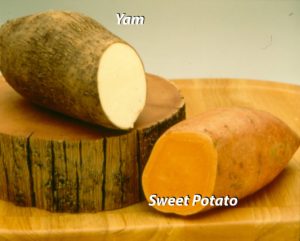By: Dr. Alyssa Musgrove
 Sweet potatoes are high in fiber – just one medium sweet potato fulfills up to 15 percent of your fiber needs for the day. Fiber slows down the absorption of sugar to prevent crashes and spikes in blood sugar levels. This makes sweet potatoes an excellent dietary addition for those with diabetes. (Compared to white potatoes, sweet potatoes have a lower score on the glycemic index.) The fiber in sweet potatoes can also aid in weight loss. Fiber helps promote satiety and cuts cravings as it moves slowly through the digestive tract. Since sweet potato is slowly digested, it is also great to incorporate on gym session days, providing you with long-lasting energy and fuel.
Sweet potatoes are high in fiber – just one medium sweet potato fulfills up to 15 percent of your fiber needs for the day. Fiber slows down the absorption of sugar to prevent crashes and spikes in blood sugar levels. This makes sweet potatoes an excellent dietary addition for those with diabetes. (Compared to white potatoes, sweet potatoes have a lower score on the glycemic index.) The fiber in sweet potatoes can also aid in weight loss. Fiber helps promote satiety and cuts cravings as it moves slowly through the digestive tract. Since sweet potato is slowly digested, it is also great to incorporate on gym session days, providing you with long-lasting energy and fuel.
Vitamin A and C play a role in many aspects of health but are especially important in boosting immunity. One medium sweet potato contains 438% daily vitamin A requirements and 37% vitamin C daily value. Vitamin A and C help stimulate the production of immune cells that fight infection and disease. In addition to boosting immunity, vitamin A plays a large role in maintaining healthy vision. If you suffer from night blindness or dry eyes, this could be a symptom of vitamin A deficiency.
There are many different varieties of sweet potatoes, and they come in a rainbow of colors. The outer skin can be white, yellow, red, purple or brown, and the flesh can be white, yellow, orange or purple. Sweet potatoes that have orange flesh are high in beta-carotene, a powerful antioxidant. Antioxidants help fight free radicals that are harmful  to the body and may protect you from things like diabetes and heart disease. Beta-carotene can protect your skin, promote healthy vision and has been shown to slow the progression of age-related macular degeneration. Studies show colored sweet potatoes contain more potent antioxidants than white sweet potatoes. Purple sweet potatoes contain the highest amount of antioxidants.
to the body and may protect you from things like diabetes and heart disease. Beta-carotene can protect your skin, promote healthy vision and has been shown to slow the progression of age-related macular degeneration. Studies show colored sweet potatoes contain more potent antioxidants than white sweet potatoes. Purple sweet potatoes contain the highest amount of antioxidants.
Some people refer to sweet potatoes as yams and use these terms interchangeably, however, there are some major differences. To begin, yams and sweet potatoes are two entirely different plants. Yams are related to lilies and grasses, while sweet potatoes belong to the morning glory family. Yams are native to Africa and Asia, while sweet potatoes originate in South and Central America. Sweet potatoes have tapered ends with smoother skin and vary in color. Yams tend to have rough skin with white flesh and are more cylindrical in shape. They also tend to be drier and starchier than sweet potatoes. While yams contain a large amount of potassium, manganese, vitamin C and B6, they are higher in calories and carbohydrates, and lower in protein. Both sweet potatoes and yams can be healthy additions to your diet when used in moderation and proper portion control.
 The preparation method is crucial in order to preserve the nutritional content of these roots. Sweet potatoes are often deep-fried, salted and served in larger portions then necessary, thereby lowering their overall nutritional profile. Instead of fried, try them baked: Preheat oven to 425 degrees, cut potatoes into fries, toss in coconut oil, sea salt and pepper and bake for 20 minutes. Then flip and bake until crisp, about 10 more minutes depending on thickness and desired crisp.
The preparation method is crucial in order to preserve the nutritional content of these roots. Sweet potatoes are often deep-fried, salted and served in larger portions then necessary, thereby lowering their overall nutritional profile. Instead of fried, try them baked: Preheat oven to 425 degrees, cut potatoes into fries, toss in coconut oil, sea salt and pepper and bake for 20 minutes. Then flip and bake until crisp, about 10 more minutes depending on thickness and desired crisp.
Sweet potato nachos are another personal favorite: Preheat oven to 425 degrees, slice sweet potatoes into ¼ inch rounds and toss with coconut oil, garlic powder, paprika, salt and pepper. Bake for 40 minutes, turning them over halfway through to ensure they do not burn. Remove from oven and add toppings like black beans, chicken or beef and cheese. Return to the oven for an additional 5 minutes or until cheese is melted. Finish by sprinkling with your favorite nacho toppings, such as chopped green onion, avocado or guacamole, salsa, greek yogurt, olives, jalapeños and salsa.
Other healthy recipe ideas include sweet potato hash, maple cinnamon sweet potato pancakes, turkey stuffed twice-baked sweet potato, sweet potato enchiladas or tacos, and sweet potato brownies.
As with anything in life, there are precautions. If you have a history of calcium-oxalate kidney stones, you may want to limit your intake. Sweet potatoes are high in oxalates that can combine with calcium and lead to the development of unwanted kidney stones. If you have diabetes be aware that, although sweet potatoes have many health benefits, they do contain carbohydrates that can raise blood sugar levels if eaten in excess. So, be sure to pair your sweet potato with a good source of lean protein and a non-starchy vegetable to make a well-rounded, nutritious meal that stabilizes blood sugar.
 Pathways to Healing specializes in holistic chiropractic care. Dr. Alyssa Musgrove draws on a variety of techniques, including chiropractic, kinesiology, nutrition, food allergy testing and lifestyle counseling to assist clients in achieving optimal health and wellness in one setting. Pathways to Healing is located at 1022 Founders Row, Lake Oconee Village, Greensboro. The office can be reached at 706-454-2040.
Pathways to Healing specializes in holistic chiropractic care. Dr. Alyssa Musgrove draws on a variety of techniques, including chiropractic, kinesiology, nutrition, food allergy testing and lifestyle counseling to assist clients in achieving optimal health and wellness in one setting. Pathways to Healing is located at 1022 Founders Row, Lake Oconee Village, Greensboro. The office can be reached at 706-454-2040.